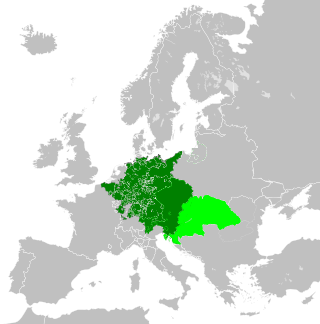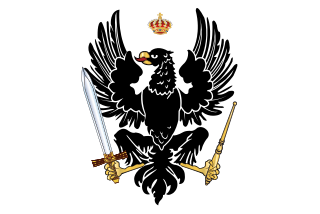Germany (officially the Federal Republic of Germany) is a country in Central Europe.
Contents
Germany may also refer to:
Germany (officially the Federal Republic of Germany) is a country in Central Europe.
Germany may also refer to:
Diet may refer to:

German Unity Day is the National Day of Germany, celebrated on 3 October as a public holiday. It commemorates German reunification in 1990 when the German Democratic Republic joined the Federal Republic of Germany, so that for the first time since 1945 there existed a single German state. German Unity Day on 3 October has been the German National Holiday since 1990, when the reunification was formally completed.

Reich is a German noun whose meaning is analogous to the English word "realm"; this is not to be confused with the German adjective "reich" which means "rich". The terms Kaiserreich and Königreich are respectively used in German in reference to empires and kingdoms. The Cambridge Advanced Learner's Dictionary indicates that in English usage, the term "Third Reich" refers to "Germany during the period of Nazi control from 1933 to 1945".
Reichstag is a German word generally meaning parliament, more directly translated as Diet of the Realm or National Diet, or more loosely as Imperial Diet. It may refer to:

The national flag of Germany is a tricolour consisting of three equal horizontal bands displaying the national colours of Germany: black, red, and gold. The flag was first sighted in 1848 in the German Confederation. The flag was also used by the German Empire from 1848 to 1849. It was officially adopted as the national flag of the German Reich from 1919 to 1933, and has been in use since its reintroduction in Federal Republic of Germany in 1949.

A federation is a political entity characterized by a union of partially self-governing provinces, states, or other regions under a federal government (federalism). In a federation, the self-governing status of the component states, as well as the division of power between them and the central government, is constitutionally entrenched and may not be altered by a unilateral decision, neither by the component states nor the federal political body.

Bremen, officially the Free Hanseatic City of Bremen, is the smallest and least populous of Germany's 16 states. It is informally called Land Bremen, although the term is sometimes used in official contexts. The state consists of the city of Bremen and its seaport exclave, Bremerhaven, surrounded by the larger state of Lower Saxony in northern Germany.

The Kingdom of Prussia constituted the German state of Prussia between 1701 and 1918. It was the driving force behind the unification of Germany in 1866 and was the leading state of the German Empire until its dissolution in 1918. Although it took its name from the region called Prussia, it was based in the Margraviate of Brandenburg. Its capital was Berlin.

German Reich was the constitutional name for the German nation state that existed from 18 January 1871 to 5 June 1945. The Reich became understood as deriving its authority and sovereignty entirely from a continuing unitary German Volk, with that authority and sovereignty being exercised at any one time over a unitary German "state territory" with variable boundaries and extent. Although commonly translated as "German Empire", the word Reich here better translates as "realm" or territorial "reach", in that the term does not in itself have monarchical connotations.
Yugoslav or Yugoslavian may refer to:

Prussia was a German state located on most of the North European Plain, also occupying southern and eastern regions. It formed the German Empire when it united the German states in 1871. It was de facto dissolved by an emergency decree transferring powers of the Prussian government to German Chancellor Franz von Papen in 1932 and de jure by an Allied decree in 1947. For centuries, the House of Hohenzollern ruled Prussia, expanding its size with the Prussian Army. Prussia, with its capital at Königsberg and then, when it became the Kingdom of Prussia in 1701, Berlin, decisively shaped the history of Germany.

The coat of arms of Germany displays a black eagle with a red beak, a red tongue and red feet on a golden field, which is blazoned: Or, an eagle displayed sable beaked langued and membered gules. This is the Bundesadler, formerly known as Reichsadler. It is one of the oldest coats of arms in the world, and today the oldest national symbol used in Europe.

There are many widely varying names of Germany in different languages, more so than for any other European nation. For example:

The national colours of the Federal Republic of Germany are officially black, red, and gold, defined with the adoption of the West German flag as a tricolour with these colours in 1949. Germany was divided into West Germany and East Germany from 1949 to 1990, and both Germanies retained the black, red, and gold colors on their respective flags. After German reunification in 1990, the united Germany retained the West German flag, thus retaining black, red, and gold as Germany's colors.

The chancellor of Germany, officially the federal chancellor of the Federal Republic of Germany, is the head of the federal government of Germany, and the commander-in-chief of the German Armed Forces during wartime. The chancellor is the chief executive of the Federal Cabinet and heads the executive branch. The chancellor is elected by the Bundestag on the proposal of the federal president and without debate.

The German Empire was a proto-state which attempted, but ultimately failed, to unify the German states within the German Confederation to create a German nation-state. It was created in the spring of 1848 during the German revolutions by the Frankfurt National Assembly. The parliament elected Archduke John of Austria as its provisional head of state with the title 'Imperial Regent'. On 28 March 1849, its constitution was implemented and the parliament elected the king of Prussia, Frederick William IV, to be the constitutional monarch of the empire with the title 'Emperor of the Germans'. However, he turned the position down. The empire came to an end in December 1849 when the Central German Government was replaced by a Federal Central Commission.

In German history, a Reichsexekution was an imperial or federal intervention against a member state, using military force if necessary. The instrument of the Reichsexekution was constitutionally available to the central governments of the Holy Roman Empire (800–1806), the German Empire of 1848–49, the German Empire of 1871–1918, the Weimar Republic (1918–33) and Nazi Germany (1933–45). Under the German Confederation (1815–66) and the North German Confederation (1867–71), the same right belonged to the confederal government and is called Bundesexekution.

Reichsminister was the title of members of the German Government during two historical periods: during the March Revolution of 1848/1849 in the German Reich of that period, and in the modern German federal state from 1919 to the end of the National Socialist regime in 1945.